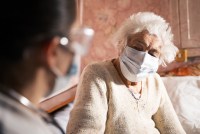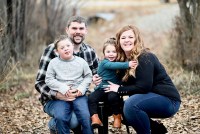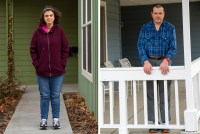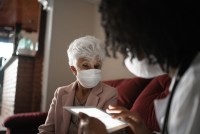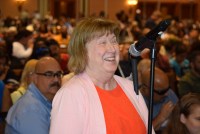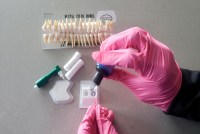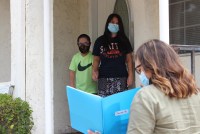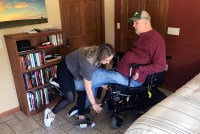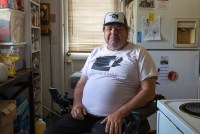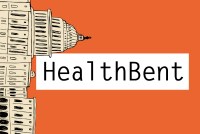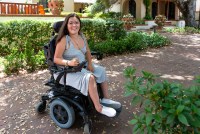Latest KFF Health News Stories
Biden Seeks $400 Billion to Buttress Long-Term Care. A Look at What’s at Stake.
Long-term care options are expensive and often out of reach for seniors and people with disabilities. The president has proposed a massive infusion of federal funding for home and community-based health services that advocates say will go a long way toward helping individuals and families.
Journalists Explore Covid Relief Bill and Vaccine Issues
KHN and California Healthline staff made the rounds on national and local media this week to discuss their stories. Here’s a collection of their appearances.
For Covid ‘Long Haulers,’ Battling for Disability Benefits Adds Aggravation to Exhaustion
Early in the pandemic, many patients couldn’t be tested. The lack of a covid diagnosis complicates disability insurance for those whose illness continues.
Push Is On for States to Ban Organ Transplant Discrimination
States are passing laws that would prevent people with Down syndrome, autism and other disabilities from being denied transplants solely because of their conditions.
Covid Vaccine Websites Violate Disability Laws, Create Inequity for the Blind
A KHN investigation found covid vaccine registration and information websites at the federal, state and local levels are flouting disability rights laws and limiting the ability of people who are blind or visually impaired to sign up for shots.
Journalists Field Questions on Covid Coverage
KHN and California Healthline staff made the rounds on national and local media this week to discuss their stories. Here’s a collection of their appearances.
Lack of Covid Data on People With Intellectual Disabilities ‘Comes With a Body Count’
People with intellectual and developmental disabilities are more likely to have medical conditions that make covid especially dangerous. But a lack of federal tracking means no one knows how many people in disability group housing have fallen ill or died from the virus.
Pandemic Sends a Couple Into Indefinite Long Distance Though Just Miles Apart
Everyone is trying to figure out how relationships work in the time of covid. That includes a Bozeman, Montana, couple who suddenly found themselves in a long-distance relationship when the pandemic sent their group homes for adults with disabilities into lockdown.
Medicare Open Enrollment Is Complicated. Here’s How to Get Good Advice.
It’s a complex program with many options — as well as confusing rules and nuances. Here’s how to get reliable guidance.
Consejos para inscribirse bien en Medicare durante la complicada inscripción abierta
Medicare se reduce fundamentalmente a dos alternativas: la tarifa por servicio del Medicare Tradicional o el enfoque de atención administrada de Medicare Advantage.
For People With Visual Impairments, Truly Secret Ballots Are Elusive
Voters in several states who live with visual impairments must rely on family and friends to fill out their mail-in or absentee paper ballots, compromising their privacy. More states are relying on mail-in and absentee voting to reduce the spread of COVID-19.
New Dental Treatment Helps Fill Cavities and Insurance Gaps for Seniors
A new treatment for tooth decay is cheaper, quicker and less painful than getting a filling. Originally touted as a solution for kids, silver diamine fluoride is poised to become a game changer for treating cavities in older adults or those with disabilities that make oral care difficult.
For Kids With Special Needs, Online Schooling Divides Haves and Have-Nots
Virtual classrooms are aggravating the economic disparities that plague education, with widening divides in access to supplies, workspace and parental guidance. The problem is especially acute for children with learning disabilities.
Pandemic Upends The Lives Of People With Disabilities — And Of Their Caregivers
Wisconsin already faced a shortage of caregivers who offer crucial health services and independence to their clients. Then the pandemic struck. In a survey of nearly 500 Wisconsinites with disabilities and older adults, every respondent said the pandemic had disrupted their caregiving service.
In Tornado Alley, Storms Are Even More Dangerous For People With Disabilities
As climate change bears down, a haphazard web of weather safeguards is a particular blow to the disabled. In Oklahoma, no state laws require homeowners or landlords to install storm shelters. If a community wants to open a storm shelter for the public, that’s up to local officials, But there’s no database that Oklahomans can consult showing where public or wheelchair-accessible shelters are located.
A Guide To Following The Health Debate In The 2020 Elections
As the Democratic primary campaign nears pivotal voting, important aspects of health care policy are being overlooked.
Elecciones 2020: guía para seguir el debate de salud
Precios, tipo de cobertura, formas de acceder a la atención, son algunos de los temas que ya están dominando el debate en este año electoral.
Sickened By Billing Abuses, Readers And Tweeters Stand Up For Patients’ Rights
Kaiser Health News gives readers a chance to comment on a recent batch of stories.
A Young Woman, A Wheelchair And The Fight To Take Her Place At Stanford
Throughout her young life, Sylvia Colt-Lacayo has been told her disability didn’t need to hold her back. She graduated near the top of her high school class. She was co-captain of the mock trial team. In April, she learned she had been admitted to Stanford University with a full scholarship. Now, the struggle to fund the caregivers she needs to leave home is proving her toughest battle yet.
Empleadores buscan nuevas formas de abordar la salud mental de los trabajadores
Mientras que un diagnóstico de cáncer puede generar solidaridad en el trabajo, admitir un trastorno psicótico puede provocar juicio, miedo y evasivas entre los compañeros.



